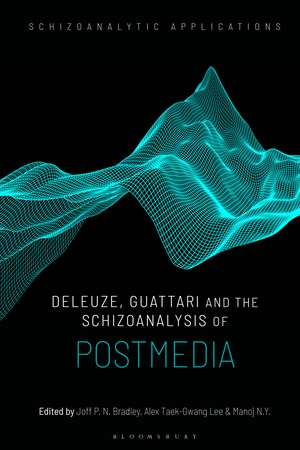Deleuze, Guattari and the Schizoanalysis of Postmedia: Schizoanalytic Applications
Editat de Joff P. N. Bradley, Alex Taek-Gwang Lee, Manoj N.Y.en Limba Engleză Paperback – 24 iul 2024
| Toate formatele și edițiile | Preț | Express |
|---|---|---|
| Paperback (1) | 192.10 lei 6-8 săpt. | |
| Bloomsbury Publishing – 24 iul 2024 | 192.10 lei 6-8 săpt. | |
| Hardback (1) | 511.23 lei 6-8 săpt. | |
| Bloomsbury Publishing – 11 ian 2023 | 511.23 lei 6-8 săpt. |
Preț: 192.10 lei
Preț vechi: 249.77 lei
-23% Nou
Puncte Express: 288
Preț estimativ în valută:
36.76€ • 38.56$ • 30.60£
36.76€ • 38.56$ • 30.60£
Carte tipărită la comandă
Livrare economică 01-15 aprilie
Preluare comenzi: 021 569.72.76
Specificații
ISBN-13: 9781350185500
ISBN-10: 1350185507
Pagini: 264
Dimensiuni: 156 x 234 x 25 mm
Greutate: 0.38 kg
Editura: Bloomsbury Publishing
Colecția Bloomsbury Academic
Seria Schizoanalytic Applications
Locul publicării:London, United Kingdom
ISBN-10: 1350185507
Pagini: 264
Dimensiuni: 156 x 234 x 25 mm
Greutate: 0.38 kg
Editura: Bloomsbury Publishing
Colecția Bloomsbury Academic
Seria Schizoanalytic Applications
Locul publicării:London, United Kingdom
Caracteristici
Joins critical postmedia studies to Deleuze and Guattari's concept of schizoanalysis to build a rigorous philosophy of the postmedia landscape
Notă biografică
Joff P. N. Bradley is Professor of English and Philosophy in the Faculty of Foreign Studies at Teikyo University, Tokyo, Japan. Alex Taek-Gwang Lee is Professor of Cultural Studies in the School of Communication at Kyung Hee University, Seoul, South Korea. Manoj N.Y. is Assistant Professor at the Centre for Culture, Media and Governance, Jamia Millia Islamia, New Delhi, India.
Cuprins
IllustrationsTablesContributorsForeword Felicity Colman (London College of Fashion at University of the Arts, UK)Acknowledgements Introduction, Joff P. N. Bradley (Teikyo University, Japan), Alex Taek-Gwang Lee (Kyung Hee University, South Korea) and Manoj N. Y. (Kyung Hee University, South Korea) Part I: Philo-fiction and Schizoid Self: Resistance to Techno-Tethering1. All Power to the Cockroaches! Postmedia and the Posthuman, Joff P. N. Bradley (Teikyo University, Japan),2. The Existential Territory of Shaheen Bagh: A Schizoanalytic Cartography, Manoj N. Y. (Kyung Hee University, South Korea)3. The Schizoanalysis of Mechanical Surveillance, Alex Taek-Gwang Lee (Kyung Hee University, South Korea) Part II: Principles of Schizo Thought4. Reflections on Postmedia for Philosophers, Edward Thornton (University of Aberdeen, UK)5. Postmedia Hans: Keeping it Real with Guattari, Janell Watson (Virginia Tech, USA)6. Postmedia and Dissensus: Reinventing Democracy with Guattari, Jean-Sébastien Laberge, (University of Ottawa, Canada) Part III: Becoming Algorithmic and Ecosophical: Struggles for Singularity7. Assemblage Line and Tactical Fluidity: Along Beijing's Lines versus Hong Kong's 'Be Water', Hsiu-ju Stacy Lo (National Yang Ming Chiao Tung University, Taiwan)8. Cartographies of the Gaze of the Other/Other Gazes: Youth, Slums, and Audiovisual Production in the Postmedia Age, Silvia Grinberg (National University of San Martin (UNSAM), Argentina) and Julieta Armella (National University of San Martin (UNSAM), Argentina)9. No media., David R. Cole, (Western Sydney University, Australia) 10. Schizoanalysis and Ecology on the Other Side of Postmedia, Mark Featherstone (Keele University, UK) Part IV: Microtechnologies and Resistance: Chaodyssey of Postmedia11. Groups of Militant Insanity versus the Videopolice: The Schizoanalysis of Radical Italian Audiovisual Media Culture as Postmedia Assemblages, Michael Goddard (Goldsmiths, University of London, UK)12. Minor Video and Becoming-Japanese: Towards Migrant Adolescent Molecular Revolution, Masayuki Iwase (University of British Columbia, Canada) 13. Akira vs Tetsuo: Postmedia Chaos as Reserve of Potentials in Guattarian Ecosophy: Akira vs Tetsuo, Toshiya Ueno (Wako University, Japan)Index
Recenzii
Félix Guattari once pointed out the promise of a post-media era on the basis of his experiences from the 1970s through to his death in 1992, involving pirate radio, emergent forms of interconnectivity like Minitel and computer-assisted design, hypertext, and the fledgling world wide web. This volume contributes substantially to the renewal of this legacy.
This volume brings together an invigorating series of essays by international scholars on the legacy of Guattari's concept of post-media. In a digital dystopia with far greater reach than last century's mass media, this stimulating book raises the urgent question - what happened to the schizo-revolutionary promise of communications technologies?
This stunning line-up of scholars in media and Deleuze-Guattari studies propose significant creative perspectives on sociocultural and schizocultural post-media analysis. By offering readings in and of the future through glimpses of the present, they think beyond current control societies to envisage new subjectivities and tools for diverse modes of action and resistance in societies to come.
Concepts and vocabulary have to be invented to keep pace with the catastrophic and rapid changes in technology. Drawing upon diverse and global examples of technologies, this book offers a powerful and urgently needed analysis of the way technology, particularly in media, can be understood through the framework of schizoanalysis.
This volume brings together an invigorating series of essays by international scholars on the legacy of Guattari's concept of post-media. In a digital dystopia with far greater reach than last century's mass media, this stimulating book raises the urgent question - what happened to the schizo-revolutionary promise of communications technologies?
This stunning line-up of scholars in media and Deleuze-Guattari studies propose significant creative perspectives on sociocultural and schizocultural post-media analysis. By offering readings in and of the future through glimpses of the present, they think beyond current control societies to envisage new subjectivities and tools for diverse modes of action and resistance in societies to come.
Concepts and vocabulary have to be invented to keep pace with the catastrophic and rapid changes in technology. Drawing upon diverse and global examples of technologies, this book offers a powerful and urgently needed analysis of the way technology, particularly in media, can be understood through the framework of schizoanalysis.









